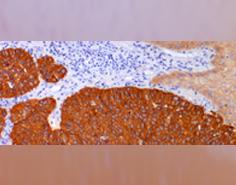The identification and validation of predictive/prognostic biomarkers is one of the greatest challenges of cancer research. The lack of reliable biomarkers reduces the efficacy of anti-cancer drugs, ranging from cytotoxic chemotherapy to EGFR targeted therapy. Head and neck squamous cell carcinoma (HNSCC) is the sixth-most common malignancy worldwide with several distinct sub sites. Despite the new treatment strategies, survival of HNSCC patients has not improved significantly in the past three decades. Several biomarkers have been analyzed in the past independently to evaluate their prognostic/predictive implications in HNSCC, however, comprehensive evaluation of these biomarkers and their correlation with the clinical outcome of patients singly or in combination is lacking. Epidermal growth factor receptor (EGFR) is overexpressed in HNSCC. EGFR pathway is closely associated with hypoxia and it has been shown to regulate cancer stem cells properties, Hence, we have planned to analyze expression of total EGFR, its activated forms, EGFR gene copy number changes, levels of hypoxia inducible factor 1α (HIF1α), its downstream targets Carbonic anhydrase 9 (CA9) and Vascular endothelial growth factor (VEGF), Cancer stem cell markers-CD44, CD44v6, CD98, (Aldehyde dehydrogenase 1) ALDH1 and also embryonic stem cell markers. Goal of this project is to study and analyze above biomarkers by univariate and multivariate analysis for their impact as predictive/prognostic biomarkers in locally advanced staged HPV negative HNSCC patients treated with either CT-RT or CT-RT along with EGFR targeting mAb- Nimotuzumab.



